College of Science, Engineering & Technology
#SciComm through FameLab SA
In the world’s largest science communication (SciComm) and public speaking competition, FameLab, emerging researchers need to present a three-minute scientifically accurate talk with clarity and charisma to a panel of judges.
The annual FameLab SA/Unisa Regional Heat coaching session and competition took place on 4 and 5 March 2020 at the Gallagher Convention Centre in Midrand.
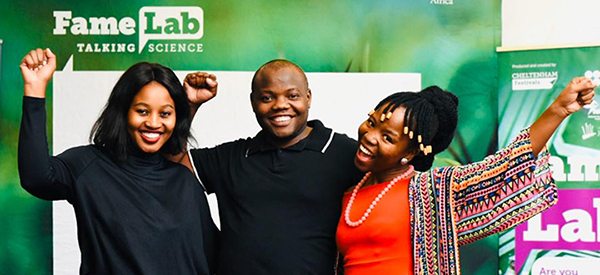
FameLab Unisa Heat runners up Karabo Mashiloane (NanoWS, Unisa) and Trevor Simbayi (IDEAS, Unisa) with winner Pinky Mokwena (Master of Applied Science in Environmental Sciences student, TUT)
Making a three-minute scientific talk possible
Participants between the ages of 21 and 35 studying or working in science, engineering, technology and mathematics went through a coaching session to sharpen their presentation skills on the first day.
The coaching, facilitated by Jive Media Africa, emphasised the fact that science communication is a critical skill that the next generation of researchers needs to acquire. During the session, participants learned how to engage audiences with or without visual aids.
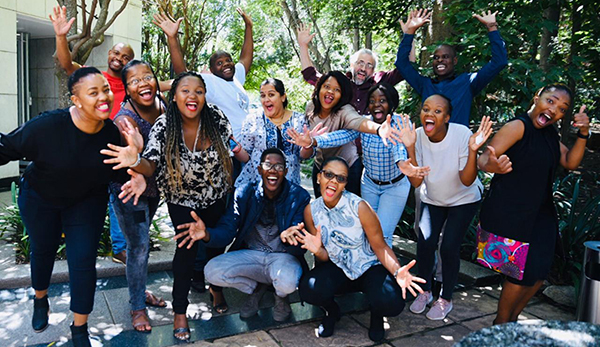
FameLab participants with Jive Media Africa facilitators
Facing the heat
Knowledgeable in science communication and public speaking, the researchers took to the stage and presented their scientific research stories in a simple, succinct and compelling manner.
While the winner of the heat, Pinky Mokwena, is from the Tshwane University of Technology (TUT), Trevor Simbayi and Karabo Mashiloane from Unisa’s College of Science, Engineering and Technology (CSET) impressed the judges and took the runner-up spots. Simbayi’s talk on the water hyacinth as an alternative source of energy and Mashiloane’s speech on making plastics hydrophobic and water repellent to create better filtration systems addressed Sustainable Development Goal 7 on affordable and clean energy.
Simbayi will be going through to represent Unisa at the 2020 FameLab SA semi-final competition held later in the year
What’s in it for the winners?
The FameLab SA national winner will receive a R5 000 cash prize and travel to Cheltenham in the United Kingdom for the international finals. The national runners-up will each win a R2 500 cash prize and the semi-finalists will receive science communication masterclass training by world-renowned researchers.
More on the regional heat winners’ talks…
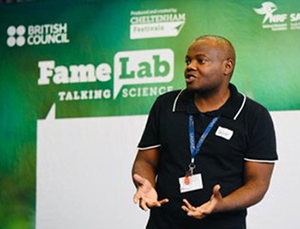
Trevor Simbayi
Stable green electricity
Trevor Malambo Simbayi is a master’s student in Biotechnology at the Institute for the Development of Energy for African Sustainability (IDEAS).
His talk was about the need to find alternative energy sources such as biogas from aquatic weed. Almost 80% of South Africa’s electricity supply is coal based. Coal power generation contributes about 60% of the carbon dioxide emissions in South Africa and poses an environmental problem.
"Greenhouse gasses contribute to global warming and fossil fuels such as coal, which we depend on, are not only detrimental to the environment but are also depleting worldwide," said Simbayi. This contributes to the power cuts that South Africa and other countries over the world experience.
As a way of producing a clean and sustainable form of energy, Simbayi’s research project proposes the use of aquatic weeds such as the water hyacinth or the red water fern. Aquatic weeds cause problems in water bodies. For example, the water hyacinth, at times, prevents economical activities at the Roodeplaat Dam. In addition, aquatic weeds cause the depletion of dissolved oxygen in water, which leads to fish dying.
If harvested and stockpiled, these aquatic weeds release methane, a greenhouse gas 21 times worse than carbon dioxide in its global warming potential.
Simbayi’s project proposes the use of aquatic waste as an alternative feedstock for energy production via a process called anaerobic digestion which produces a flammable gas called biogas. Biogas can be used to generate energy for cooking and electricity. The use of aquatic weeds will clean up the environment and produce stable green electricity.
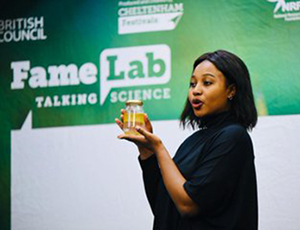
Karabo Mashiloane
Plastic hydrophobic
Karabo Mashiloane is a PhD candidate in the Nanotechnology and Water Sustainability (NanoWS) research unit.
"Oil spillages by the petroleum industry pollute the water we drink and inhibit the growth of plants. They are also harmful to animals," says Mashiloane.
Mashiloane’s research seeks a solution to the oil spillage problem. She said other solutions such as gravity settling, do not produce a 100% separation of water and oil. Another technique, known as coagulation, involves adding a chemical that attracts oil present in water droplets. The problem with this solution is that it is not environmentally friendly as it involves chemicals.
The Membrane Filtration System is a sustainable solution that Mashiloane came up with, under the supervision of Prof Edward Nxumalo. They propose a type of plastic with holes small enough to allow one liquid to pass while retaining the other. With their type of plastic, any oil, no matter how small the droplets, will pass through the membrane filtration system and the water will be left on top.
"With this efficient solution we will get a 100% separation of water and oil," said Mashiloane.
We can most assuredly rely on young scientists like Simbayi and Mashiloane to keep the Unisa research flag flying high!
* By Mpho Moloele, PR and Communications Assistant, Department of Research, Innovation, and Commercialisation
Publish date: 2020-03-26 00:00:00.0

 Young Unisa doctoral graduate joins elite Lindau Nobel Laureate group
Young Unisa doctoral graduate joins elite Lindau Nobel Laureate group
 Education MEC addresses Unisa autism seminar
Education MEC addresses Unisa autism seminar
 Seven Unisans nominated for the NSTF-South32 Awards 2023/2024
Seven Unisans nominated for the NSTF-South32 Awards 2023/2024
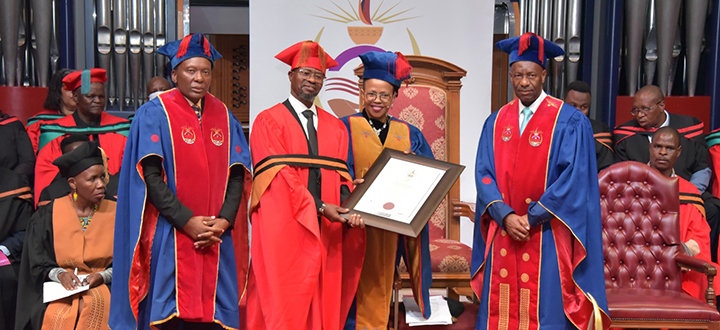 Unisa awards posthumous honorary doctorate to literary maven, OK Matsepe
Unisa awards posthumous honorary doctorate to literary maven, OK Matsepe
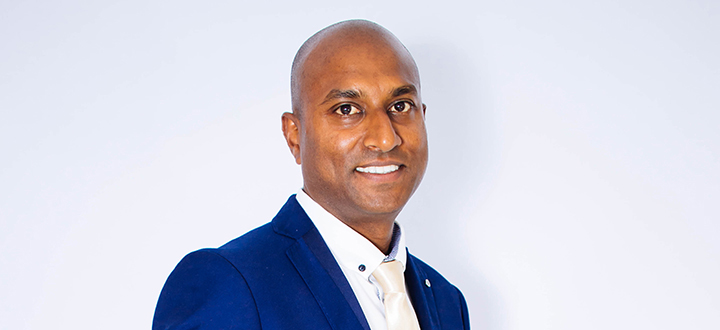 From humble beginnings to academic leadership
From humble beginnings to academic leadership